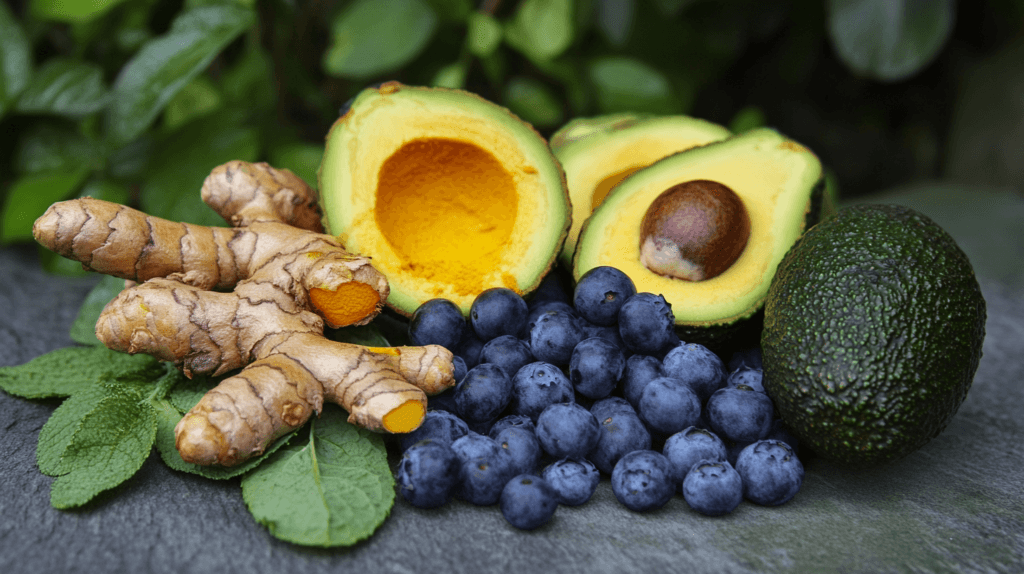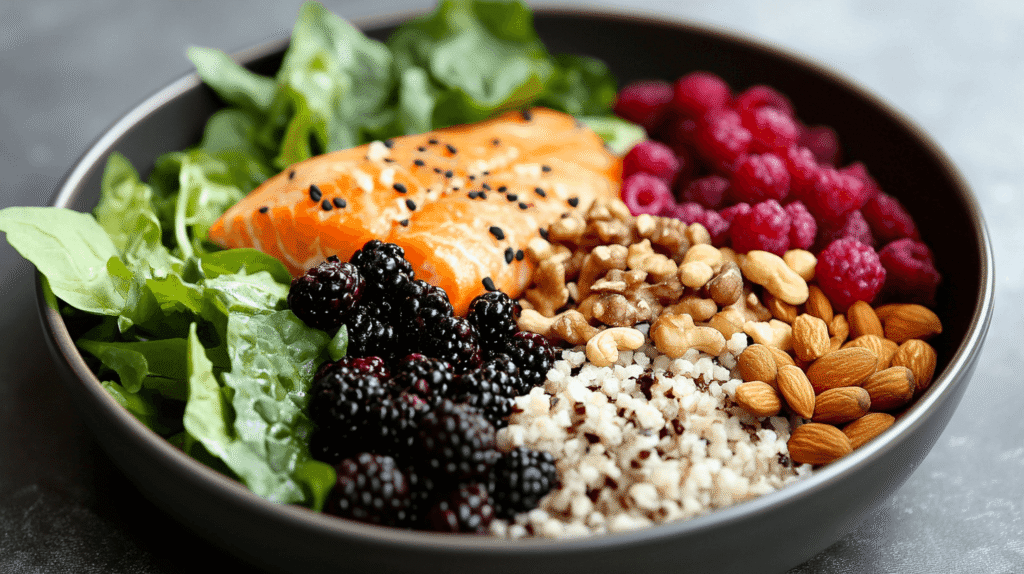What is the Cortisol Detox Diet? It is a holistic approach designed to help regulate cortisol levels, also known as the “stress hormone.” In today’s fast-paced world, stress is a constant, and while cortisol helps our bodies respond to challenges, chronic stress can lead to elevated cortisol levels that negatively impact overall health. This specialized diet focuses on nutrient-rich foods, lifestyle changes, and stress-reducing practices to bring cortisol levels back into balance.
The Cortisol Detox Diet is designed to help reset your cortisol levels by focusing on nutrition, lifestyle changes, and stress management. It promotes eating nutrient-rich foods while avoiding those that spike cortisol, helping to bring balance back to your life. But what exactly does this diet entail, and how can it benefit you? Let’s dive in.
Table of Contents
Understanding Cortisol: The Stress Hormone
Functions of Cortisol in the Body
Cortisol is a hormone produced by the adrenal glands, sitting atop your kidneys. It plays a critical role in:
- Regulating metabolism: Ensuring your body effectively converts food into energy.
- Responding to stress: Acting as a key component of the “fight or flight” response.
- Maintaining blood sugar levels: Stabilizing energy for physical and mental activities.
In small doses, cortisol is essential for survival, helping you react to challenges. However, prolonged high levels can lead to health issues.
How Cortisol Affects Your Health
When cortisol levels remain elevated for too long, the effects can be harmful. You may experience:
- Weight gain, especially around the midsection.
- Sleep disturbances, making it difficult to fall or stay asleep.
- Anxiety and irritability, contributing to mood swings.
- Increased inflammation, which can lead to chronic diseases like heart disease and diabetes.
What is the Cortisol Detox Diet?
The Cortisol Detox Diet is a holistic approach designed to help balance cortisol levels in the body through targeted nutrition, lifestyle changes, and stress management techniques. At its core, this diet seeks to address the physical and emotional effects of prolonged stress by focusing on foods and habits that regulate the stress hormone cortisol.
Cortisol is produced by the adrenal glands in response to stress and plays a crucial role in regulating various bodily functions such as metabolism, inflammation, and energy levels. While cortisol is essential for survival in short bursts, chronic high levels—often caused by persistent stress—can lead to a range of health issues, including fatigue, weight gain, anxiety, and weakened immunity.
The Cortisol Detox Diet aims to reset the body’s hormonal balance by:
- Providing nutrient-dense foods that support adrenal gland health and reduce inflammation.
- Eliminating foods and substances that exacerbate cortisol production, such as refined sugars, caffeine, and alcohol.
- Encouraging lifestyle changes like mindfulness practices, proper sleep hygiene, and regular, moderate exercise to lower stress levels naturally.
Core Principles of the Cortisol Detox Diet
- Nourishment Through Food
The diet emphasizes whole, unprocessed foods that stabilize blood sugar levels and reduce oxidative stress. Foods rich in antioxidants, omega-3 fatty acids, magnesium, and adaptogenic herbs are prioritized to help the body recover from chronic stress. - Reducing Stress-Inducing Foods
Certain foods, such as those high in refined sugars, processed carbohydrates, and artificial additives, can trigger cortisol spikes and should be avoided. Similarly, stimulants like caffeine and alcohol disrupt cortisol regulation and are restricted in this diet. - Incorporating Lifestyle Adjustments
Food alone isn’t enough to detox cortisol effectively. The diet incorporates lifestyle habits that complement its effects, including quality sleep, mindfulness practices, and physical activities like yoga and walking.
Goals of the Cortisol Detox Diet
The primary goal of this diet is to reset cortisol levels, but it also offers several additional benefits, including:
- Improved Energy: By stabilizing blood sugar and reducing cortisol spikes, you’ll feel more energized throughout the day.
- Reduced Inflammation: Anti-inflammatory foods help alleviate chronic conditions associated with stress.
- Better Sleep: Balanced cortisol supports healthier sleep patterns and reduces insomnia.
- Emotional Stability: Lower cortisol levels help mitigate anxiety and mood swings, improving overall mental well-being.
Signs You May Need a Cortisol Detox
Our bodies are excellent at signaling when something isn’t quite right. High cortisol levels often manifest through various physical, emotional, and mental symptoms. If you’ve been feeling off, it might be time to consider a cortisol detox.
Physical Symptoms of High Cortisol Levels
Elevated cortisol can lead to noticeable changes in your body, including:
- Persistent fatigue: Even after a full night’s sleep, you might feel drained and sluggish.
- Unexplained weight gain: Especially around your abdomen, as cortisol promotes fat storage.
- Weakened immune system: Frequent colds or infections may indicate chronic inflammation.
- Muscle weakness: Difficulty building or maintaining muscle can be a sign of prolonged cortisol elevation.
- Digestive issues: High cortisol can slow digestion, leading to bloating or discomfort.
Emotional and Mental Indicators
Cortisol impacts your brain as much as your body. You may notice:
- Increased anxiety and irritability: High cortisol intensifies your stress response, making you more reactive.
- Difficulty concentrating: Brain fog and forgetfulness are common when cortisol is out of balance.
- Sleep disturbances: Trouble falling asleep or staying asleep often signals elevated cortisol levels.
If these symptoms sound familiar, adjusting your diet and lifestyle with the Cortisol Detox Diet may provide relief.
Foods to Include in a Cortisol Detox Diet

The right foods can help your body stabilize cortisol levels, reduce inflammation, and enhance your overall well-being. Here’s what to prioritize.
Anti-Inflammatory Foods
Foods rich in antioxidants combat oxidative stress, a common result of high cortisol. Include:
- Leafy greens: Spinach, kale, and Swiss chard are loaded with nutrients that fight inflammation.
- Berries: Blueberries, strawberries, and raspberries are antioxidant powerhouses.
- Nuts and seeds: Almonds, walnuts, flaxseeds, and chia seeds offer healthy fats and magnesium.
- Fatty fish: Salmon, mackerel, and sardines provide omega-3 fatty acids, which reduce inflammation.
Adaptogenic Herbs and Spices
Adaptogens are natural substances that help regulate your body’s stress response. Add these to your meals:
- Ashwagandha: Known for its cortisol-lowering properties.
- Turmeric: Curcumin, its active compound, fights inflammation and supports hormonal balance.
- Ginger: Aids digestion and reduces inflammation, calming the gut.
Nutrient-Rich Superfoods
Superfoods provide a concentrated source of vitamins and minerals that promote balance. Key examples include:
- Avocados: Packed with healthy fats and potassium for adrenal health.
- Quinoa: A complete protein that stabilizes blood sugar levels.
- Dark chocolate: In moderation, it can lower cortisol and improve mood.
Foods to Avoid for Lowering Cortisol Levels

While certain foods can help, others can worsen cortisol imbalances. Eliminating these from your diet is crucial.
Refined Sugars and Processed Foods
Sugar and processed snacks cause blood sugar spikes, triggering cortisol release. Avoid:
- Candy and sugary beverages: These lead to energy crashes and hormonal imbalances.
- Fast food: High in unhealthy fats and additives that stress the body.
Caffeine and Alcohol
These stimulants disrupt cortisol regulation and sleep patterns:
- Caffeine: Consuming large amounts can keep cortisol levels elevated throughout the day.
- Alcohol: While it may feel relaxing short-term, it interferes with the body’s natural stress response.
High-Sodium Foods
Excessive salt increases blood pressure, adding strain to the body’s stress response system. Cut down on:
- Processed meats: Like bacon, sausages, and deli cuts.
- Canned soups: Often loaded with hidden sodium.
Lifestyle Changes to Support the Cortisol Detox Diet
Managing cortisol isn’t just about food. Adopting stress-reducing habits is equally important to achieve balance.
Importance of Sleep Hygiene
Sleep is essential for cortisol regulation. Poor sleep leads to elevated cortisol the next day. Tips for better sleep include:
- Establish a routine: Go to bed and wake up at the same time daily.
- Limit screen time: Avoid screens at least an hour before bedtime.
- Create a calming environment: Keep your bedroom dark, quiet, and cool.
Stress Management Techniques
Incorporating stress-reducing practices can make a big difference:
- Meditation and mindfulness: Helps calm the mind and lower cortisol levels.
- Yoga and deep breathing: Combines physical activity with relaxation techniques.
- Journaling: Writing down thoughts can reduce mental stress.
Regular Physical Activity
Exercise can lower cortisol, but moderation is key. Overtraining may spike cortisol levels. Aim for:
- Low-impact exercises: Walking, swimming, or cycling.
- Strength training: Boosts metabolism and balances hormones.
- Relaxing activities: Pilates or tai chi for gentle movement.
Benefits of Following the Cortisol Detox Diet
Adopting the Cortisol Detox Diet can have profound effects on both your physical and mental health. By restoring balance to cortisol levels, you can unlock a range of benefits that improve your overall quality of life.
Improved Energy Levels
Chronic high cortisol often leaves you feeling fatigued, even after rest. By eating nutrient-rich foods and stabilizing blood sugar, the Cortisol Detox Diet helps your body produce sustainable energy. You’ll likely notice:
- Fewer energy crashes throughout the day.
- Increased ability to handle daily tasks without feeling overwhelmed.
Better Emotional Well-Being
When cortisol is balanced, your mood tends to stabilize. The diet’s emphasis on anti-inflammatory foods and stress-reducing practices supports mental health. Benefits include:
- Reduced feelings of anxiety and irritability.
- Enhanced focus and mental clarity.
- Improved resilience to stressful situations.
Enhanced Immune Function
High cortisol suppresses the immune system, making you more prone to illnesses. This diet helps reduce inflammation, strengthen immune responses, and promote healing. Expect:
- Fewer colds and infections.
- Faster recovery from illnesses.
Weight Management
Balancing cortisol can prevent stress-induced weight gain, especially around the midsection. The diet promotes fat-burning, reduces cravings, and improves metabolism, aiding healthy weight loss.
Scientific Evidence Supporting the Cortisol Detox Diet
The Cortisol Detox Diet isn’t just a trend—it’s backed by scientific research and expert recommendations. Here’s a look at the evidence supporting its effectiveness.
Research on Cortisol and Diet
Studies have shown that certain foods and nutrients directly impact cortisol levels. For example:
- Omega-3 fatty acids: Research highlights their role in reducing cortisol during stressful situations.
- Magnesium-rich foods: Found in nuts and seeds, these help lower cortisol and improve sleep quality.
- Adaptogens: Ashwagandha and Rhodiola have been studied for their cortisol-lowering properties.
Expert Opinions on Cortisol Detox
Nutritionists and endocrinologists emphasize the importance of diet in managing cortisol. Experts often recommend reducing processed foods and incorporating stress-lowering practices alongside dietary changes to achieve optimal results.
FAQs About the Cortisol Detox Diet
Is the Cortisol Detox Diet Safe for Everyone?
In general, the Cortisol Detox Diet is safe for most individuals. However, people with specific health conditions, such as adrenal insufficiency or hormonal disorders, should consult a healthcare professional before starting this diet. For a delicious way to manage cortisol levels, consider trying a Cortisol Cocktail Recipe as a complement to your routine.
How Long Does It Take to See Results?
Results vary depending on the individual. Most people notice initial improvements in energy and mood within 1–2 weeks. Long-term benefits, such as weight loss and enhanced immune function, may take a month or more to become apparent. For inspiration, explore How to Incorporate Healthy Drinks in Your Diet.
Can Supplements Help Lower Cortisol Levels?
Yes, supplements can complement the Cortisol Detox Diet. Common recommendations include:
- Magnesium: Helps relax muscles and reduce cortisol.
- Vitamin B complex: Supports energy production and stress response.
- Ashwagandha: An adaptogen known for lowering cortisol naturally.
Can Exercise Help Reduce Cortisol?
Absolutely. Moderate-intensity exercise, such as walking or yoga, can lower cortisol levels. However, avoid overtraining, as excessive exercise can elevate cortisol.
What Are the Signs of a Successful Cortisol Detox?
Signs that your cortisol detox is working include:
- Better sleep quality.
- More stable energy levels.
- Reduced stress and anxiety.
- Improved focus and mental clarity.
You can also pair your detox journey with easy and nutritious recipes that promote overall well-being.
Conclusion
The Cortisol Detox Diet is a holistic approach to managing stress, improving energy, and enhancing overall health. By focusing on nutrient-dense foods, eliminating stress-inducing items, and incorporating lifestyle changes, this diet helps restore balance to your cortisol levels. Whether you’re battling fatigue, mood swings, or stubborn weight gain, this diet can guide you toward a healthier and more balanced life.

